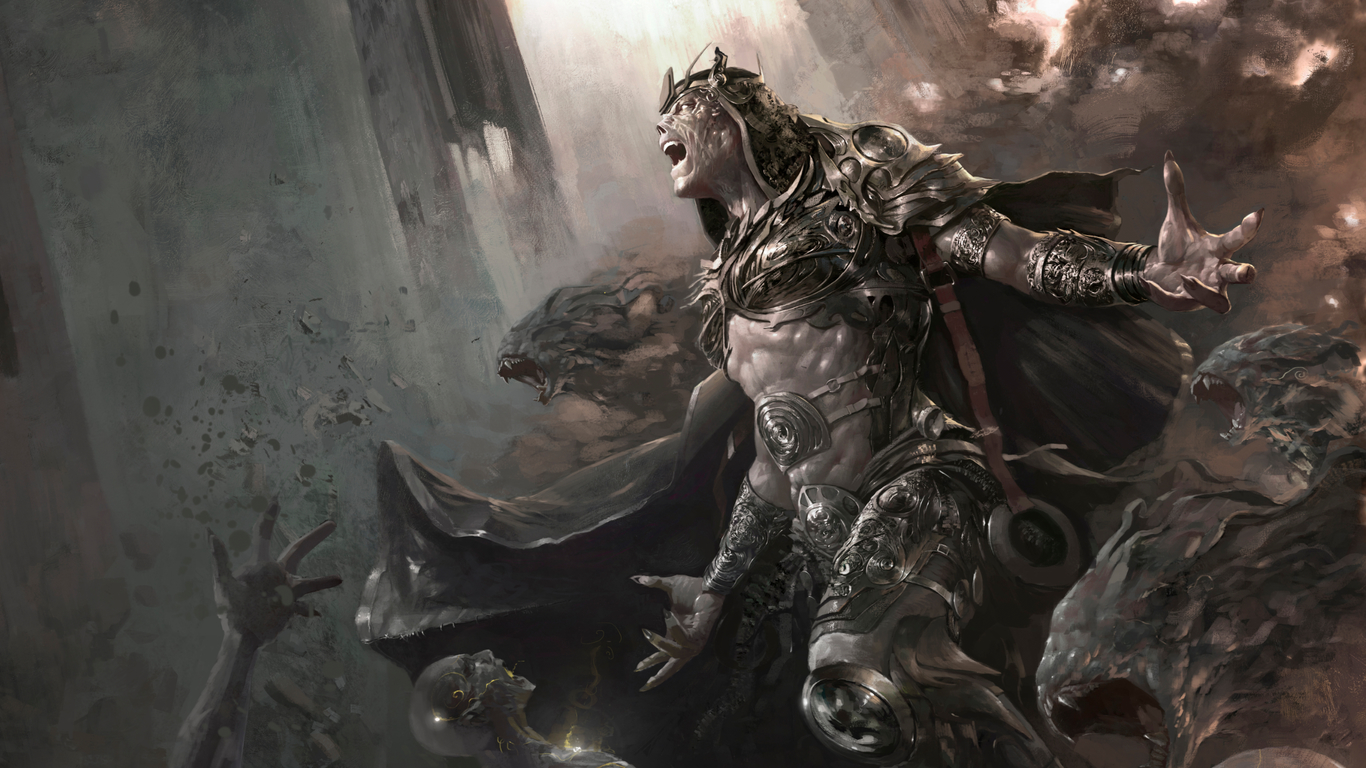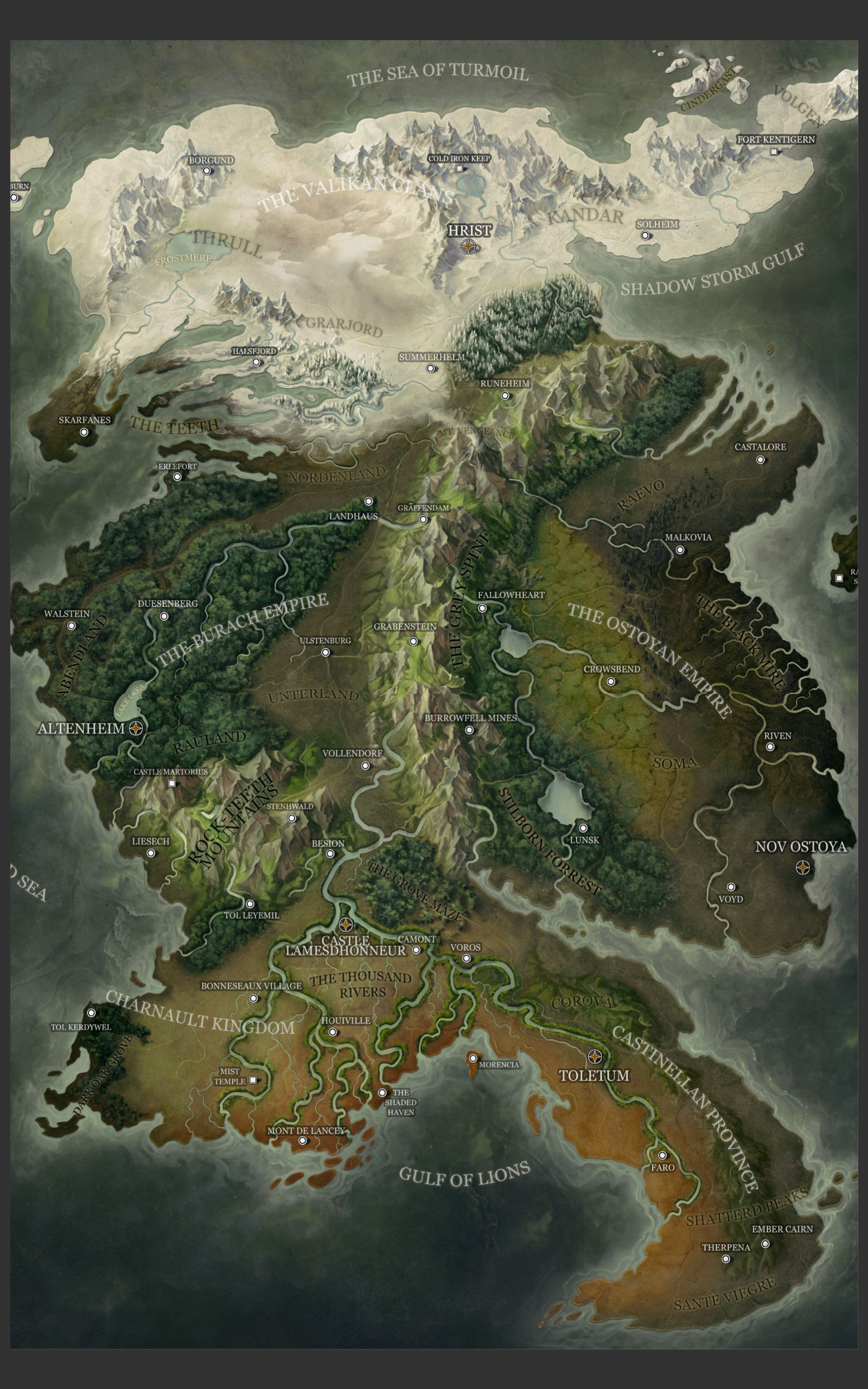Remove these ads. Join the Worldbuilders Guild

Etharis
From its deep and forbidding forests, where horrible beasts lurk, to the hulking and impenetrable mountain ranges, where lost legacies lie, the landscape of Etharis is dark and formidable. However, the true monsters of this land can be found in the degenerating cities of old, where humanity clings to survival. Before embarking in this unforgiving land, it is important to establish several defining features of Etharis
Darkness and Obscurity
Large swaths of Etharis are shrouded in darkness, supernatural and otherwise. In the farthest north, the sun is hidden half the year in the natural progression of seasons. It's no surprise, either, that the deep halls of the dwarves are plunged into darkness. But the darkness surrounded the land of Ostoya is more sinister and magical in origin, and in the forests of the Charneault Kingdom, the dense mist that covers the land is the work of benign spirits - or at least spirits that bend to the will of mortals, both good and evil. The people of all these lands have adapted to the hostile environment. Punishing storms are frequent across the land, foreshadowed by howling winds and drenching rain. Where the sun never dries the ground, mud is a constant fact of life. The crops that grow are strange and bitter. For most people, there is no safety outside the radius of a torch's glow.
The Land is Dangerous
Civilizations dot the land as if they were islands of light surrounded by the unforgiving terrain of shadowy forests, rough mountainscapes, and sinking bogs. Travelers are often met with suspicious gazes by locals, many of which have never left the isolation of their village.
Relentless threats assault humanity. Vicious creatures hunt wandering children and armed travelers alike, many of whom are never heard from again. Sinister forces seek to twists mankind's nature to their whims, leaving them forever changed.
Travel is a perilous endeavor, especially at night (in parts of the world fortunate enough to enjoy a sunlit day). Armored columns of merchant caravans transport goods, nervously guarded by mercenaries who refuse to deviate from known roadways. Travelers caught in the dark are forced to lodge at remote roadside inns for extortionate prices, should they be fortunate enough to be near one when night falls. Local guards are quick to leave folks out in the dark if they do not have the coin to pay.
A Lost Pantheon
In their never-ending struggle to control Etharis, the deities of this world fought what they could not defeat, and ultimately turned on and destroyed each other. With but few knowing this truth, many believe that the gods long since abandoned this forsaken world, or never existed to begin with. The only remnants of their reign are their surviving lieutenants - the Arch Seraphs and Arch Daemons - and the forces they control.
Arch Seraphs overlook the world with a righteous zeal, granting powers to a select few that fight in their crusades. Separated from their deities for so long and stranded in a cruel land, many of them have deviated from what they once represented, twisting their ideals into whatever suits their cause.
Arch Daemons take delight in a world overrun by shadows and decay. Freed from the deities' power, they relish opportunities to feed their cruel appetites. They take keen interest in mortal lives, often living among them, making deals, and twisting fate to ensure threats to their existence are destroyed.
A Sickening Plague
Sickness and malnutrition are common and expected throughout the land of Etharis; however, there is one illness that is feared above the others. The Weeping Pox is widespread across the western coasts of the continent and frequently strikes harbors and coastal settlements. Distinguishable by the deep red lesions it creates in the skin of the infected, the disease is a death sentence for most.
The few who can cure the plague guard their secret closely and extract the highest prices for their intervention. The price of deliverance, for those with the choice, may be a noble estate, eternal service to the Arch Seraph of Mercy, or something far more precious.
Fear of the Arcane
Superstition and prejudice run deep. In most towns and villages across Etharis, magic is seen as wonderful and frightening. Whether understood or not, the arcane is mistrusted and often blamed for problems ranging from the failure of a season's crops to the success of a rival's business. Many innocent people have been caught on the wrong end of superstition.
The fear of magic runs deeper in some parts of Etharis than others. In the southern region of Castinella, this fear has manifested into an organized crusade against the arcane: the Arcanist Inquisition. The inquisitors are dedicated to destroying the arcane and anyone who stands to defend it.
Not all of Etharis despises spellcasters. Many cities house great colleges dedicated to the art of magic. Within these cities' walls, spellcasters can apply for a permit to practice their craft. These permits dictate where a mage can cast spells, what type of spells they can cast, and other specifics. The process to apply for such a permit is often frighteningly bureaucratic, and many spellcasters choose to hide their abilities instead.
Glimmers of Hope
Etharis as a campaign setting is not meant to be relentlessly bleak and depressing, or to wallow in cruelty for its own sake. Small victories become heroic when they take heroic effort to achieve. No one in Etharis is safe by default, so any safety your character wins or gives to others is a true blessing. No one in Etharis is good by default, so moments of genuine grace are worth celebrating - and can come from unexpected places. Amid profound darkness, even the smallest lights have value.







